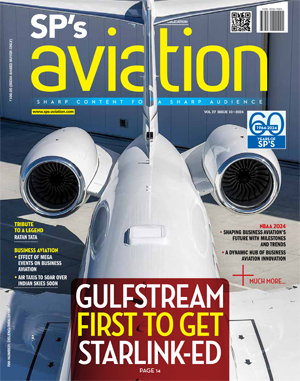INDIAN ARMED FORCES CHIEFS ON OUR RELENTLESS AND FOCUSED PUBLISHING EFFORTS

SP Guide Publications puts forth a well compiled articulation of issues, pursuits and accomplishments of the Indian Army, over the years

"Over the past 60 years, the growth of SP Guide Publications has mirrored the rising stature of Indian Navy. Its well-researched and informative magazines on Defence and Aerospace sector have served to shape an educated opinion of our military personnel, policy makers and the public alike. I wish SP's Publication team continued success, fair winds and following seas in all future endeavour!"

Since, its inception in 1964, SP Guide Publications has consistently demonstrated commitment to high-quality journalism in the aerospace and defence sectors, earning a well-deserved reputation as Asia's largest media house in this domain. I wish SP Guide Publications continued success in its pursuit of excellence.
Promote Indigenous Manufacturing
DRDO and the DPSUs in India must take the lead and spearhead the responsibility of developing an effective aerospace manufacturing ecosystem in India

The development of indigenous defence technologies by the Defence Public Sector Undertakings (DPSUs) in India has been a major focus of the Indian government in recent years. The government has implemented a number of policies and initiatives to promote indigenisation, as a result of which, the DPSUs have made significant progress in developing indigenous defence technologies and manufacturing them, in some cases in collaboration with the Defence Private Sector.
The role of Defence Public Sector Undertakings and the Defence Research and Development Organisation (DRDO) is pivotal in shaping and nurturing an effective defence manufacturing ecosystem in India. They can play a significant role in fostering a robust aerospace and defence manufacturing ecosystem in India.
Technological Innovation and Expertise: DPSUs, being state-owned enterprises, possess a wealth of technological expertise and experience in defence manufacturing and production. They can contribute to R&D by providing a platform for developing cutting-edge technologies, testing prototypes, and refining manufacturing processes. DRDO, as the primary agency responsible for defence R&D, can collaborate with DPSUs to leverage their existing capabilities, ensuring that research efforts are practical and aligned with manufacturing capabilities.
Collaboration and Knowledge Sharing: DPSUs and DRDO can foster collaboration among various stakeholders, including academia, private industries, and research institutions. By sharing knowledge, research findings, and best practices, they can create a synergistic environment that accelerates the development of new technologies and solutions. Such collaborations can lead to a broader exchange of ideas and the pooling of resources, ultimately enhancing the overall defence R&D ecosystem.
Indigenous Development and Self-Reliance: A strong defence manufacturing ecosystem requires a focus on indigenous development of critical technologies and equipment. DPSUs and DRDO can work in tandem to reduce the dependency on foreign suppliers and enhance India’s self-reliance in defence production. By developing indigenous technologies and solutions, they contribute to building a resilient defence infrastructure that can withstand geopolitical uncertainties.
Human Resource Development: DPSUs and DRDO also play a pivotal role in nurturing a skilled workforce in the field of defence R&D and manufacturing. They offer opportunities for engineers, scientists, and researchers to work on challenging projects and gain hands-on experience in cutting-edge technologies. This helps in retaining and attracting talent, which is essential for the continuous growth of the aerospace and defence manufacturing ecosystem in India.
Technology Transfer and Commercialisation: The efforts of DPSUs and DRDO can lead to the development of technologies that have dual-use applications in civilian sectors. By promoting technology transfer and commercialisation, they can contribute to the growth of the broader Indian industrial base, fostering innovation across various industries beyond defence.
Standardisation and Quality Assurance: DPSUs can play a crucial role in establishing standards and quality assurance processes for defence equipment and technologies. This ensures that products meet stringent requirements and adhere to international standards, enhancing the credibility of Indian defence products in the global market.
Risk-Taking and Innovation Culture: DPSUs and DRDO can create an environment that encourages risk-taking and innovation. By supporting unconventional and high-risk projects, they can pave the way for breakthrough technologies that might not receive immediate commercial interest. This culture of innovation can lead to the development of game-changing solutions for national defence.
The government’s focus on indigenisation has helped to reduce India’s dependence on foreign arms imports, and has also boosted the Indian defence industry. However, there is still more work to be done. The DPSUs need to continue to invest in research and development, and they need to work closely with the private sector to develop new and innovative defence technologies. This would be a major boost for the Indian defence industry, and it would create an effective aerospace and defence manufacturing ecosystem in the country and help ensure India’s security in the years to come. With continued investment and support, both DRDO and the DPSUs have the potential to become world leaders in the development and manufacturing of indigenous defence technologies.
The synergy between DPSUs and DRDO is vital for establishing a dynamic and effective aerospace and defence manufacturing ecosystem in India. Their combined efforts can drive technological advancements, promote self-reliance, foster collaboration, and contribute to the overall growth and security of the nation. In the interest of national security, DRDO and the DPSUs must lead the indigenous aerospace industry of the nation, and strive to develop the technological capability not only to meet with the requirements of weapon systems for the Indian armed forces through indigenous production, but those of friendly nations and allies as well especially in the neighbourhood.





